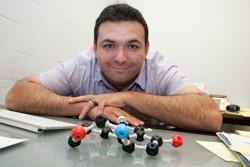
UC Researcher Announces Progress Toward New Chemotherapy Agents
Advances in chemotherapy have dramatically improved the outlook for many cancer patients, but the side effects of this treatment are daunting. A new generation of chemotherapy drugs with fewer side effects is the goal of Edward J. Merino, assistant professor of chemistry at the University of Cincinnati.
Merino will discuss his efforts toward designing these new anticancer agents Tuesday, March 27, at The Chemistry of Life: Spring National Meeting and Exposition of the American Chemical Society in San Diego.
At that meeting, Merino will show a new anticancer agent that targets cancerous cells by zeroing-in on the pollutants produced by the characteristic metabolism within tumors. This agent, which Merino calls a ROS-caged agent, is activated by oxidative stress, a signature of cancerous activity.
Cancerous cells use energy differently from other cells, Merino said. Like an automobile engine with the gas pedal pushed to the floor, they give off a unique sort of pollution because they are not as efficient in using energy. Cancer cells dont use metabolism all the way through. We have found key enzymes that contribute to this characteristic signature.
This signature results from the build-up of reactive oxygen species, known as ROS. This environment creates a chemical target that Merino and his team can target with chemical systems. Merino describes his findings as a preliminary description of the factors that can make drug delivery much more selective.
We are looking for chemicals that operate like heat-seeking missiles that attack only cancerous cells, Merino said. If we are successful, we can create drugs with far fewer side effects.
The side effects associated with chemotherapy hair loss and weight loss are generated from the mechanism used to target todays family of drugs. Because cancerous cells reproduce rapidly, chemotherapy targets rapidly reproducing cells. The problem, Merino said, is that cells in the stomach lining and cells in our hair follicles also reproduce rapidly so conventional chemotherapy kills those cells, too.
A better understanding of cancer metabolism is an essential part of the work, but so is the basic chemistry involved in creating targeted compounds.
We are continually making new compounds, Merino said, but very few of them give any indication of working. Out of hundreds of candidates, we have one moving into a mouse model, and another that looks promising.
Merino's work is supported by the University Research Council.
Related Stories
President Pinto shares search update for executive vice...
March 25, 2025
President Neville Pinto shares search update for executive vice president for academic affairs and provost
Ohio takes steps to stop spread of invasive pear trees
March 21, 2025
WLWT talks to UC biology Professor Theresa Culley about Ohio's ban on the sale or planting of nonnative and invasive pear trees. The trees are showing up in many parks and wild areas where they are crowding out native species.
UC’s renovated Old Chem will feature bird-safe glass
March 21, 2025
Renovations to a building at the University of Cincinnati feature windows designed to prevent the needless deaths of migratory birds.
